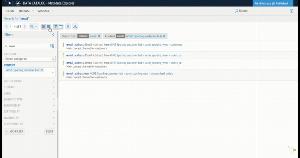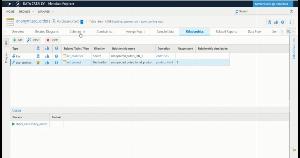Business Glossary tools for Solr
List of tools that help build, maintain an share business glossaries.
Business Glossary is a collection of definitions and terms used within a business unitorganization. It is not used to define data, but rather to define what a particular term means from a business perspective. The definitions are mapped and logically linked to entities in the database. This enables structured communication between teams and allows them to reveal potential errors resulting from incorrect nomenclature.
Talend Data Catalog
Talend Data Catalog automatically crawls, profiles, organizes, links, and enriches all your metadata. The tool supports data privacy and regulatory compliance with intelligent data lineage tracing and compliance tracking. With a collaborative user experience, it enables anyone to contribute metadata or business glossary information.
| Data Policies and Rules: |
|
|---|---|
| Export: | CSV,JSON,MS Excel,PDF,XML |
| Integration with Technical Metadata: |
|
| Linkage to reports/apps: |
|
| Reference data: |
|
| Support for workflow: |
|
There are many tools for creating business glossaries. Whether sophisticated or not, they allow to create:
• access and alternate names,
• descriptions,
• explanations of how to calculate metrics,
• links to other elements.
To ensure access to all terms from different platforms, many business glossary tools are cross-platform compatible. More advanced tools provide a workflow to ensure that term definitions are updated and approved. In addition to the glossary creation features, the tools allow you to export to user-friendly and easy-to-share formats like PDF and HTML.
Proper communication between teams in an organization is crucial for the success of the project. Similarly, it is important to interpret data correctly. Each of the teams working together (business team, developers, marketing teams), use different nomenclature and terms. Within a team the logical meaning of data elements, acronyms, etc. are defined and understood only by a narrow group of members. This makes the area of inconsistency really wide. Even small misunderstandings can lead to fatal consequences. This is where the business glossary comes into play.
What's more, using glossaries not only makes the communication more reliable, but also improves efficiency and speeds up the decision-making process (e.g. wondering if "customer" means a single person, an organization, and repeating the consideration next time the project is approached).
In our list, we have included noteworthy business tools for creating and reviewing business glossaries.
 SQL Server
SQL Server
 Oracle
Oracle
 MySQL
MySQL
 PostgreSQL
PostgreSQL
 Amazon Redshift
Amazon Redshift
 Azure SQL Database
Azure SQL Database
 DBT
DBT
 Google Big Query
Google Big Query
 IBM DB2
IBM DB2
 MariaDB
MariaDB
 SAP HANA
SAP HANA
 Snowflake
Snowflake
 SQLite
SQLite
 Teradata
Teradata
 Vertica
Vertica

